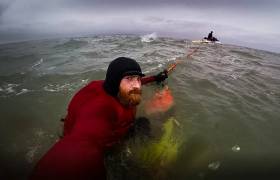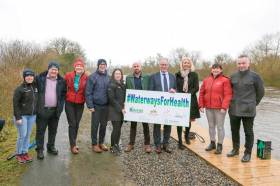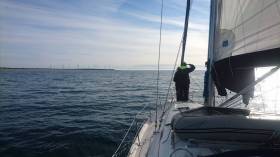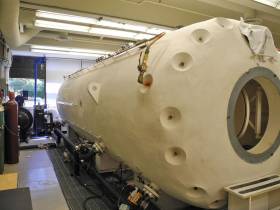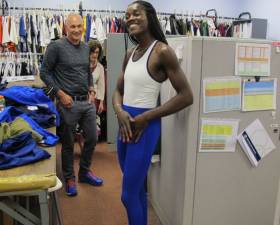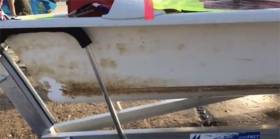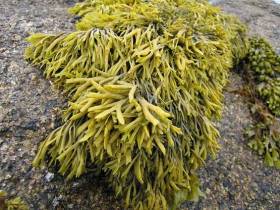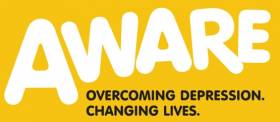Displaying items by tag: Health
Big wave surfer Al Mennie talks to the Belfast Telegraph about how he keeps fit and healthy between his challenging surfing experiences.
In a candid Q&A, the Portrush surfer — who features in BBC Two NI show Tide this Sunday 16 June at 9.45pm — reveals the extent of the punishment he’s put his body through to ride the biggest swells.
“[From] surfing I have had broken ribs, have split my head open several times and have been concussed. I often think I’ve been very lucky.”
The “extreme” of this sportsman’s chosen field even extends to his diet — or rather, two diets.
“I eat very well and see myself as an athlete and need to fuel my body, but you will see me in a well-known fast food chain the odd time,” he says.
Perhaps understandably for someone who undertakes such a high-stakes endeavour, Mennie confesses he is “full on all the time”.
“Because I am a surfer, people think I must be chilled out — I am actually really far from being chilled out. At night I'm writing books or working on some sort of plan.”
Mennie’s book Overcome or Succumb was published last year, as previously reported on Afloat.ie. And the Belfast Telegraph has more on his story HERE.
In other surfing news, Dublin Gaelic football forward Ciaran Kilkenny tells the Irish Examiner how riding the waves had become a part of his fitness regimen.
“I generally try to go the day after a game, because you get a bit of a recovery in, too,” he says.
“Even for the head, it’s great to go to a place like Bundoran, or Strandhill or Lahinch, the sea breeze, it’s great to go down and get in the water and up on the board.”
The Irish Examiner has more on the story HERE.
Waterways Ireland Encourages Locals In Kildare, Carlow & Laois To Get ‘Walking On Water’ This Spring
Waterways Ireland has announced the launch of a walking programme along canal and river routes across Kildare, Carlow and Laois.
The aim of the Waterways For Health programme — in conjunction with Get Ireland Walking, and Local Sports Partnerships from Kildare, Carlow and Laois — is to immerse participants into natural waterway environments with guided support from county walking facilitators from Local Sports Partnerships.
“Waterways Ireland has seen a huge increase in the number of recreational and tourist users on and along all our waterways in recent years,” said Sharon Lavin of Waterways Ireland>
“With the provision of our Blueway and Greenway trails, we have now created even more opportunities for people to try new recreational activities. This also offers greater health and well-being and social opportunities for locals”.
For more information on the new Waterways For Health programme, its partners and their services, see GetIrelandWalking.ie and www.SportIreland.ie (to find your Local Sports Partnership).
Sailing Is A Powerful Tool To Mental Wellness
#Wellness - The therapeutic benefits of sailing have been highlighted by Social Entrepreneurs Ireland’s 2017 awardees Sailing into Wellness.
The Cork-based non-profit social initiative provides an opportunity for vulnerable groups to experience a completely new environment on the open sea.
For those with mental health issues, recovering from addiction or from disadvantaged backgrounds, sailing is proven to be a powerful tool in their development, say the organisers.
Working together as a team, individuals are supported to overcome personal challenges in an environment that is both exhilarating and therapeutic.
So help spread the word and bring a friend next time you are heading out for a potter in the bay.
If you’re interested in supporting Sailing into Wellness, contact [email protected]
Galway Earmarked For Hyperbaric Therapy Centre
#Diving - Planning permission is being sought for a new hyperbaric therapy centre in Galway city centre, as Galway Bay FM reports.
Regularly used for the treatment of damaged body tissues, hyperbaric facilities are also key to the treatment of decompression sickness, or ‘the bends’ – a risk for deepwater divers.
Last November, Cork’s SCUBA diving community announced plans to raise funds for a local hyperbaric chamber, as previously reported on Afloat.ie.
Cork Diving Community Fundraising For Hyperbaric Chamber
#Diving - The SCUBA diving community in Cork is raising funds for a hyperbaric chamber to treat divers with decompression sickness, as the Irish Examiner reports.
Otherwise known as ‘the bends’, the potentially fatal condition is contracted when nitrogen bubbles form in the bloodstream of divers who surface from deep dives too quickly.
However, there is only one hyperbaric chamber required for the necessary oxygen therapy that caters for diving emergencies in the Republic, located in Galway.
That’s prompted the creation of the Munster Hyperbaric Chamber Project, to provide emergency facilities for affected divers in Ireland’s south-west in time for the 2017 diving season. The Irish Examiner has more HERE.
In other diving news, two English SCUBA clubs have shared a top award for their expedition to Ratlin Island off the Causeway Coast, according to the Bury Times.
Divers from Bury and Wigan in the greater Manchester area were awarded the Expedition Trophy at the British Sub-Aqua Club Diving Conference recently for their reef and shipwreck dives out of Ballycastle — including one visit to a cruiser torpedoed during the First World War.
Ocean Warming Poses Threat To Marine Wildlife & Food Chain
#OceanWarming - Warming oceans are not only throwing marine ecosystems into disarray, but are also encouraging the spread of water-borne bacteria and viruses around the world, a new study warns.
The Irish Examiner reports on new findings from the International Union for Conservation of Nature (IUCN), which says the world is "completely unprepared" for the consequences of ocean warming, which have already been seen as fish and marine mammal species move into cooler northern waters.
Coming in their wake, however, are tropical pathogens such as Vibrio vulnificus, related to the cholera bacteria, and potentially toxic algal blooms that could enter the food chain – comprising what scientists are calling the "greatest hidden challenge of our generation".
Rising sea temperatures are already wreaking havoc on corals off East Africa in the Indian Ocean, and affecting the breeding success of seabirds, ocean reptiles, jellyfish and plankton – the foodstuff of large baleen whales and basking sharks, which frequent Irish shores.
The Irish Examiner has more on the story HERE.
Anti-Microbe Suits No Match For Rio Pollution
#Rio2016 - Antimicrobial suits could be an answer to Rio 2016's pollution issues. But are they all they're cracked up to be?
Headlines have made much of the microbe-resistant properties of the new costumes designed for the US Olympic rowing team, as Ars Technica reports.
Comprising two layers, one to wick water from the skin and the other with an antimicrobial finish, the fabric is being talked up for its properties of protection against the water-borne pathogens in Guanabara Bay and the Rodrigo de Freitas lagoon – the latter where rowers will compete next month.
But the textile engineer behind the design says any such claims are "overblown".
Speaking to Vocativ, Mark Sunderland of Philadelphia University confirmed that the antimicrobial finish was an "afterthought" and comparable to athletic wear already on the high street.
Indeed, the primary benefit to rowers is the suit's seamless fit, covering less than half of the body – designed for comfort in high-performance conditions, not for health reasons.
Vocativ has more on the story HERE.
Slick Stains Boats In Rio Olympic Sailing Waters
#Rio2016 - Olympics organisers in Rio have a new headache alongside Zika concerns and rising crime – the city's sailing waters are turning boats brown.
After Chilean 49erFX squad Team Gumucio posted the above video to Facebook, further reports have emerged of sailors getting caught in an oil slick on Guanabara Bay.
"We've never seen anything like this. It was all over the place," Finnish sailor Camilla Cedercreutz told the Associated Press after the slick stained the white hull of her boat brown.
It appears sailors training in Rio's waters ahead of next month's Games now have to add industrial pollution to their list of issues with the Olympic aquatic venue on top of floating debris and high levels of pathogens.
#Seaweed - Could breathing in the iodine released by seaweed on Ireland's coasts be improving our health?
The answer is quite possibly, according to new research as reported in The Irish Times this week.
Scientists at UCD and NUI Galway have concluded that iodine levels are highest among those regularly breathing coastal air rich in seaweed, which concentrates iodine from seawater.
Their paper in the Irish Medical Journal was informed by two decades of studies in three different environments in Ireland: coastal cities (Dublin, Belfast, Galway), inland areas (Mullingar and Dungannon) and seaweed-rich Carna in Co Galway, where almost half the population has iodine intake above the WHO recommended level.
The Irish Times has much more on the story HERE.
#Surfing - Surfers from across the North West paired up to take part in a unique event to raise money for mental health charity Aware NI last week.
The money raised at the tandem surfing competition, run by Portrush-based surfing school Troggs, will help Award NI provide vital services for people affected by depression across Northern Ireland.
Teams of surfers took to Portrush East Strand on Sunday 20 March to perform tricks and manoeuvres in pairs in an attempt to impress the experienced judges.
The tandem surfing competition, the first of its kind in Northern Ireland, raised over £300 (€372) for Aware NI.
The event was the brainchild of Carl Russell, owner of Troggs Surf School, after some of his own clients recommended the benefits of surfers in overcoming the own depression.
“The idea came about from my brother Jamie Russell and I realising that we could experience surfing together on the same board when surf conditions weren’t favourable for our shortboards,” he said.
“We ended up having as much fun if not more tandem surfing as we did surfing normally. Then the link for the competition was made to show that the proven research that surfing helps depression is a real tool that can be used."
Russell explained that surfing "has had positive effect on people and clients of ours with mental health issues which is why we have chosen this charity, plus this professional organisation really helps people.
"We run custom surf programmes for groups affected by the issues mentioned. Our event is due to run again September-October 2016 and will be even bigger.
“Thanks to all our sponsors gregwallace.co.uk, garymccall.co.uk, couconoutdoor.com, Brew Note Portrush & AC Electronics Coleraine.
Only last year the French seaside town of Biarritz become the first in the world to prescribe surfing lessons as a way to treat depression to heart disease.
Some 20 doctors are taking part in a pilot scheme in Europe’s surf capital to encourage the notoriously pill-popping French to cut back on medication and take to the waves.
“Aware fully endorse the message that physical exercise cannot only improve your physical health but also your mental health,” said Kieran Hughes, fundraising officer at Aware NI.
“The benefits of physical exercise for mental health are widely recognised and surfing is one of the best examples of that. Participants are getting excellent exercise but also getting out in the open and close to nature which can only be a positive thing.
“We would like to sincerely thank Carl and everyone at Troggs Surf School for raising money for Aware. All the money raised will go towards Aware’s Support Services and education programmes to help people affected by depression across Northern Ireland.”


























